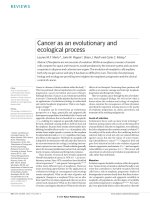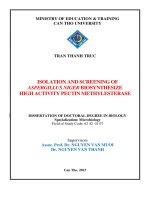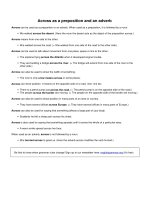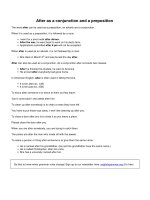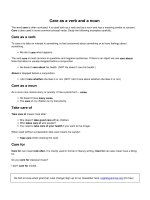Instead as an adverb and preposition
Bạn đang xem bản rút gọn của tài liệu. Xem và tải ngay bản đầy đủ của tài liệu tại đây (11.02 KB, 1 trang )
Instead as an adverb and preposition
Instead is an adverb. It means ‘as an alternative’.
He didn’t buy a large loaf. Instead, he bought two small loaves.
She didn’t go to Greece. Instead, she went to Italy.
Don’t marry Peter. Marry me instead.
As an adverb instead goes at the beginning or at the end of a clause. When it goes at the beginning of a
sentence, we usually separate it off with a comma.
Instead of is a preposition. Note that instead is not used alone as a preposition.
Compare:
I’ll have a piece of cake instead of cookies, please. (NOT I’ll have a piece of cake instead cookies.)
Here the phrase instead of is used as a preposition. Note that a preposition is always followed by a noun or a
noun phrase which acts as its object.
I don’t want cookies. Instead, I’ll have a piece of cake. Here the word instead is used as an adverb. An
adverb doesn’t take an object.
Can I have a laptop instead of a tablet computer?
I would like to buy a house instead of a flat.
Instead of can be followed by an –ing form. Infinitives are not normally used.
I spent the whole day in bed instead of going to work. (NOT I spent the whole day in bed instead of to go
to work.)
Stay on top of your writing! Download our grammar guide from www.englishgrammar.org to stay up-to-date.
Powered by TCPDF (www.tcpdf.org)
